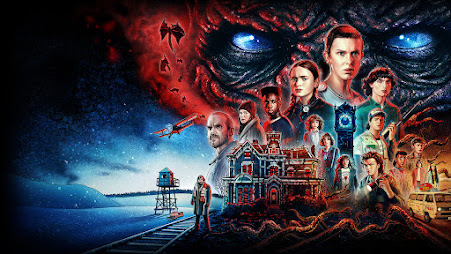On the face of it, there is nothing especially interesting about Stranger Things. It seems to be a tidy blend of John Hughes movies like The Breakfast Club and Some Kind of Wonderful, teen adventure films like The Goonies and Stand by Me, TV shows like Saved by the Bell and Beverly Hills 92510, with various supernatural/conspiracy ideas culled from the novels of Stephen King (Carrie, It, The Stand) and Dean Koontz (Sole Survivor, Twilight Eyes) adding weight to the mix.
Why do Zoomers and younger Millennials find all this Gen-X retro-schlock so engaging in the twenty-first century?
While it is not an easy question to answer in simple terms, there is a strong sociological component to Stranger Things; and this component not only explains the show's popularity, its also offer insights into the mass inceldom and gender conflicts of the present age. Let us begin:
- The show is set in the early 1980s, when a strong and well-defined youth culture prevailed. The 80s had immensely powerful and lucrative youth cultures with magazines and music aimed exclusively at the young. This culture continued into the 90s but was effectively dead by the end of that decade. Obviously, the decultured and drifting modern Zoomer is going to find this vibrant youth culture incredibly novel and inspiring in relation to his own isolated, vacuous life.
- The 80s was the last decade with powerful symbolic signifiers, especially those associated with youth culture. The pan-Anglosphere youth culture of that decade transcended genders, sexualities or socio-economic classes: everyone knew the same stars and underwent the same rituals (prom nights, concerts, movies, TV and radio shows). These shared, global signifiers made it relatively easier for members of Generation X to relate to each other across barriers of class and (especially) gender. My suspicion is that this facilitated broader friendship groups and in turn, more opportunities for relationship formation. Gender relations are quite different today, where most girls are TikTok mini-celebrities while most males are sexually marginalised pariahs.
- The absence of modern social media plus the media monoculture of that time made the 80s the last decade with instantly recognisable global superstars. Music generated by organic, coherent youth cultures makes a powerful and vivid soundtrack for Stranger Things.
- The 1980s was the last Cold War decade, which empowered rebellious youth cultures by default. The threat of nuclear annihilation inevitably does great things for youthful rebellion; by contrast, branded consumerism and social media promote youthful conformity.
- The absence of social media or mobile devices permits normal interactions between the characters in Stranger Things. Again, such real interactions appeal strongly to 'tech-alienated' Millennials and Zoomers.
- Stranger Things cleverly hides 80s problems like endemic racism, presenting a sanitised and appealing view of the decade. The 80s were not flawless, by any means; but Millennials and Zoomers do not need to know that to appreciate the show.
- Chronological proximity: in simple terms, the 80s are close enough to the present for modern youth to appreciate them. The 80s had video games (albeit in arcades), an emergent black middle class and a vocal LBTG movement. The overtly sexist and racist Boomer culture of the 50s, 60s and 70s is now too culturally remote (and offensive) for modern audiences. The 80s hits the 'sweet spot' in terms of cultural proximity as no other decade can.
So there were have it: the appeal of Stranger Things to people who were not even born when most of its cultural icons were stalking the lands. Unfortunately, cultural time only moves one way; so the dynamic youth culture that defined the 80s is gone forever, never to return. Its memes will persist as nostalgia only, while the Anglosphere hobbles onward into mass inceldom and overt gender-conflict.

















